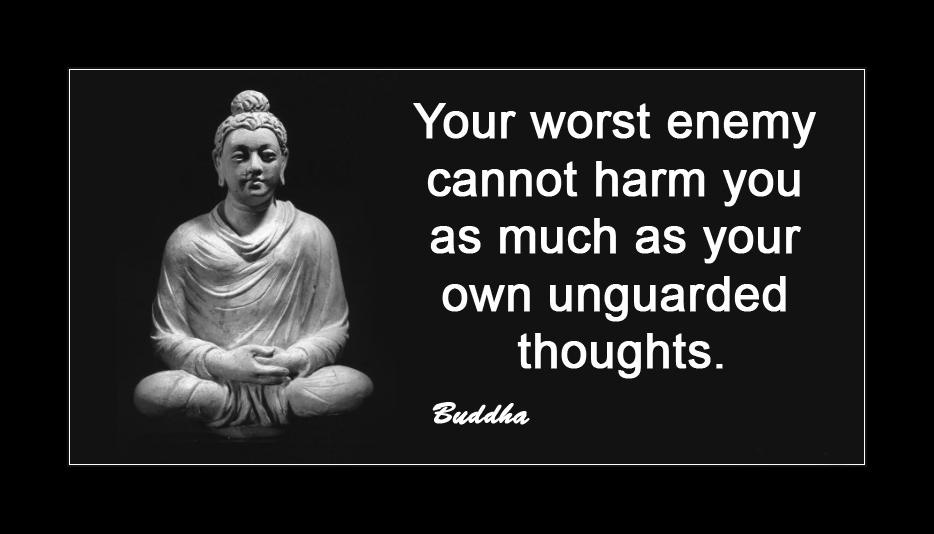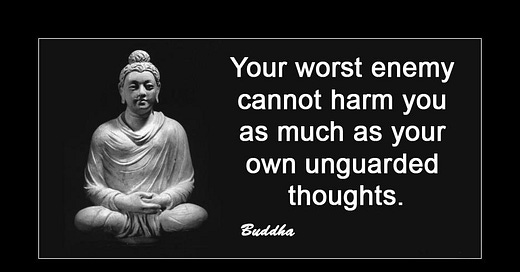This is the second part of ‘Eight Verses of Thought transformation.’ In this blog, I discuss verses 3 and 4.
3. In all actions, I will examine my mind
And the moment a disturbing attitude arises,
Endangering myself and others,
I will firmly confront and avert it.
It is your mind and so you need to be aware of what is going on in there. You need to be mindful of your thoughts, feelings, emotions and body sensations, and what you are saying and doing. When you spot a negative emotion arise don’t welcome it in and allow it to control of your mind and actions, tell it to stop stealing your happiness and peace of mind. Don’t foolishly let your mind take control of your actions.
We need to do the same with attachment. When attachment appears in your mind don’t welcome it in and think it is going to make you happy – it isn’t. Understand that attachment is setting you up for suffering, so be mindful and do not get carried away by attachment.
All negative emotions, such as anger, jealousy, pride, loneliness and so on, endanger us
because they make us create negative habits and patterns in our mind, leading to future suffering.
Negative emotions do not just cause us problems in the future, they also make us unhappy right now. We never feel good when we are angry, jealous or attached to things. They also endanger others as well. Whenever we act on our negative emotions, our speech and acts are unkind and unhelpful.
When negativity enters our mind we also become mistrustful. We mistrust what people are saying and doubt their actions. Don’t allow your mind to be filled with mistrust or you will get tangled up in unhelpful thoughts. This will also lead to future suffering for you and people around you.
If negative emotions arise, we must apply the antidotes. For attachment, we meditate on impermanence. For anger, we meditate on patience and compassion. For jealousy, we meditate on being happy for what is happening to others. For lack of trust, we meditate on the breath to calm our mind.
Verse three means that we must guard our minds at all times. Think of yourself as a gardener and imagine your mind as a garden. Positive thoughts are the beautiful flowers that brighten your life. Negative thoughts are the ugly weeds that spread and suffocate the flowers. Ensure your mind is full of beautiful flowers and not harmful weeds.

4. Whenever I meet a person of bad nature
Who is overwhelmed by negative energy and intense suffering,
I will hold such a rare one dear,
As if I had found a precious treasure.
‘Whenever I meet a person of bad nature.’ The people this line is talking about are angry and difficult to get along with. They challenge what we think and believe. They also challenge our sense of identity and what we do. These people may not judge themselves to be bad natured people, but we do, because they do not like us or what we do. In fact, we believe they do not pay us enough attention and do not appreciate what we do. We think of them as uncooperative people.
‘Who is overwhelmed by negative energy and intense suffering.’ People who are overwhelmed by negative energy are those who have lots of anger, jealousy, hatred or attachment. Whenever we are around people such as these we feel their confusion and restlessness. We usually turn away from those people.
People with intense suffering could be those who are sick or grieving a loss. Seeing unwell people reminds us of our own mortality and we try our best to keep our minds away from thinking about death. When we encounter people who have severe emotional problems, we shy away from them. We seem to have so many adverse reactions to other beings, and when we come across them we pull down the shutters in our mind and do our best to exclude them.
People with negative energy, intense suffering or a bad nature can be friends, strangers or people we dislike. The last thing we want to do is to hold them dear as if they were precious treasures. But, this is exactly what we need to do. With this verse of thought transformation, we cease blocking them out as if they don’t have feelings. Instead, we see their humanity.
We realise they are just like us, that want to be happy and they don’t want to suffer. We build compassion and empathy for these people and understand they, like us, are just a product of causes and conditions.
A person does not choose to get angry. Someone doesn’t think, “I’m going to get angry and make my life miserable.” These emotions arise due to causes and conditions. Instead of disliking another person, we should practice seeing him or her as something created by causes and conditions. They were not born like this, life has made them this way.
If we think about it, people we don’t like and people who harm us are in the minority. The number is actually very small. These people are rare. If we are going to practice patience we need these people. It is not possible to practice patience on people we like because they are already kind to us. Finding people that we don’t like or who give us problems is not so easy. So, when we finally find them, they are a precious treasure! When we meet them, we should think, “Fantastic, I get to practice patience now.” We need to cherish them and do not miss the opportunity to practice patience.
I will discuss verses five to eight in future blog posts.
You can read more blogs, listen to podcasts, watch videos and practice guided meditations on the Buddhism Guide app. Available from the Apple Store and Google Play.
If you would like to become a supporter of Buddhism Guides work, such as podcasts, blogs, videos and guided meditation practices, please visit here. You can support for as little as $2 a month.



